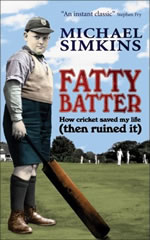Fatty Batter: How Cricket Saved My Life (and Ruined It)
David Taylor |Published: 2007
Pages: 320
Author: Simkins, Michael
Publisher: Ebury Press
Rating: 4 stars

Here’s a book written by one of cricket’s no-hopers for the rest of us. Bit-part actor Michael Simkins (lots of TV work, no leading roles though) tells the story of how he became hooked on cricket and how it came to take over his life – although ‘ruined’ is surely going too far. Its really a book of two halves, the first dealing with his childhood obsession and unhappy attempts to learn to play the game; the second with his own team of misfits, the Harry Baldwin Occasionals.
The story starts in the summer of 1966, which as everyone knows was when the football World Cup was being played in England. Young Michael has no interest in the game, at a time when “if you didn’t love football, you didn’t really exist.” He is unathletic in stature, owing to his parents running a sweet shop, and is the object of derision from his schoolmates. But his father is into cricket, and one day Michael spots Colin Milburn, a grown-up version of himself, on TV. He settles down beside his dad and starts to learn about the game. Before long he’s hooked. On World Cup Final day our hero goes to watch Sussex play in the County Championship, where he quickly meets other like-minded individuals.
From there the obsession grows. Someone gives him a set of ‘Owzthat’ dice, and he takes charge of his own matches, players and tournaments. He plays rudimentary games in the back of the shop with a cricket set given by a desperate sales rep. But attempts at formal coaching are doomed to failure, and at secondary school he never threatens to make the team, except on one occasion when they’re decimated by illness.
In adult life Simkins works for a while doing commentary for a phone-in service, but bored of that after two seasons he starts up his own club. Harry Baldwin was a portly Victorian cricketer, whose photo inspires Simkins to use his name. The second part of the book is taken up with reports, to use the term loosely, of matches played by this side. Simkins himself works hard at his batting and becomes a useful contributor, but his bowling never loses the comedic quality which so bemused coach Les Lenham. Some of the stories in this section are so far-fetched that they really do stretch credulity, but are very funny nonetheless. He also writes touchingly about his family, who encourage him in his cricket without understanding much about it.
This sort of book has been written before – ‘Rain Men’ by Marcus Berkmann and ‘Many a Slip’ by Gideon Haigh spring to mind – but this is right up there with the best.






Leave a comment